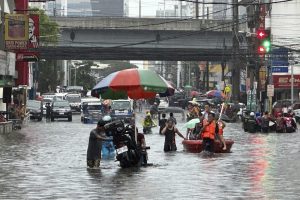Massive flooding in the capital region and an oil spill disaster have wrought havoc in the Philippines, as officials underscored the debilitating effect of climate change and the need for sustained and comprehensive preparation at all levels of government.
Typhoon Gaemi, known locally as Carina, caused heavy rainfall in Metro Manila and nearby provinces which led to the worst flooding disaster in the nation’s biggest urban center since 2009. As of July 28, government data showed that a total of 1,228,904 families, or 4,514,896 persons, had been affected by the typhoon and subsequent flooding.
Public scrutiny was directed at the government’s flood control program, since Philippine President Ferdinand “Bongbong” Marcos Jr. mentioned the completion of more than 5,000 projects in his recent state of the nation address.
Several senators have expressed dismay since the approved budget for flood control is higher than the funding for irrigation, construction of hospitals, and even the Department of National Defense.
Senator Alan Peter Cayetano bemoaned the slow rollout of flood control projects. “It’s a direct result of years of inaction on crucial flood control projects. This delay isn’t just a failure, it’s a disservice to our communities that are now left unprotected and vulnerable,” he said in a statement.
After inspecting the situation on the ground, Marcos insisted that flood control and water pumping projects are working in Metro Manila as he blamed the combined effects of Typhoon Carina, the southwest monsoon, and the high tide for the unusually high level of flooding. He also cited “indiscriminate garbage disposal” as a problem, urging the people to stop dumping trash in waterways.
But green groups lambasted the president for “shamelessly scapegoating the people and climate change.” The Kalikasan environment network described the president’s statement as “misleading” and “dangerous distortion of reality.”
“The government, not the citizens, bears the ultimate responsibility for flood prevention and mitigation, even in the face of climate change,” the group stated.
It attributed the flooding disaster to the “massive plunder of watersheds and reclamation” in Manila Bay. It noted the quarrying operations in Rizal, a province east of Manila, and the presence of 19 mining projects covering a total of 3,622 hectares.
Even some senators linked the flooding to the intensified reclamation in Manila Bay. Marcos Jr himself ordered the temporary suspension of reclamation projects last year after environmental concerns were raised.
Meanwhile, as floodwaters were receding, another disaster was reported when a tanker carrying 1.4 million liters of fuel capsized in Manila Bay. The vessel’s fuel has already started to leak but authorities assured the public that the impact of the oil spill would be minimal. A task force was immediately created by the government to oversee the retrieval of the ship and the containment of the oil spill.
There are reports that the oil slick has already reached the shores of some towns near Manila, which poses a direct harm to coastal residents aside from undermining the livelihoods of fisherfolk and the local population and destroying marine habitats.
Green group Oceana asserted that “it is time to impose even higher penalties and stricter accountability measures” for oil spill incidents resulting from the failure to follow protocols and weather advisories.
The flooding and oil spill disasters exposed not just the vulnerability of the Philippines to climate change but also the weak infrastructure of flood-prone cities, inadequate disaster preparation, and flawed early warning system. The tanker was cleared for transport even if Typhoon Carina was battering the nation’s capital, which could put into question the existing shipping guidelines during weather disturbances.
As the proposed 2025 budget is now in the hands of Congress, legislators are expected to grill officials in charge of flood control projects. They could also spend more time scrutinizing the president’s infrastructure budget which could reveal contentious projects especially items related to the pork barrel allocation of the government.
The twin disasters could also affect the trust rating of the country’s top two leaders. The president needs to convince the public that the 5,000 flood control projects worth billions of pesos were really completed and effective. As for Vice President Sara Duterte, she drew flak for going to Germany on a personal trip while a million of her constituents were displaced by floods.

































